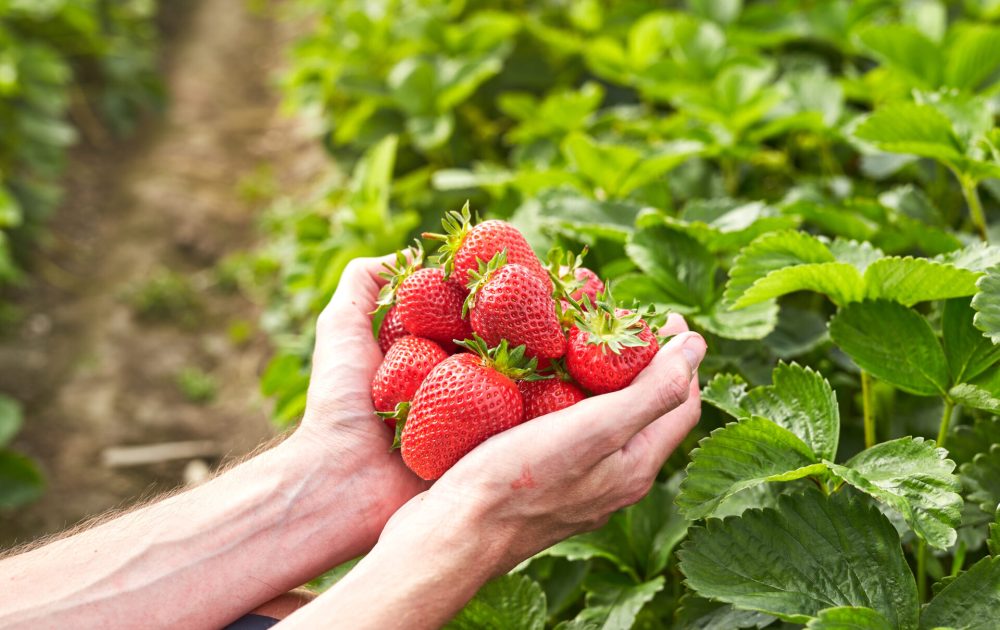Our test tells you which everyday chemicals you've recently come into contact with, and easy steps you can follow to reduce your exposure to them.
Healthy reasons to grow your own strawberries

We consume a whopping 80m+ tonnes of strawberries in the UK each year. Many of us love them because their sweet flavour is synonymous with summertime, and they are a source of Vitamin C, important for our immune system health. Along with other soft fruits such as raspberries and blueberries, strawberries are a rich source of phytochemicals (also known as phytonutrients) which are found in brightly coloured fruit and vegetables. Phytochemicals are part of plant immune system defences, and are thought to have similar health benefits to humans when we eat them.
Strawberries are a rich source of Anthocyanins, which are antioxidants found in red, blue and purple fruits and vegetables with anti-inflammatory properties that can help to reduce the risk of illnesses including cancer, diabetes, and heart disease. They’re also a reliable source of flavonoids which have beneficial cardiovascular effects and may help to lower blood pressure. Strawberries also have beneficial effects on bacteria in the gut. One study found that strawberries slow down the digestion of glucose whilst moderating the use of insulin, so it’s worth eating a handful after you’ve eaten.
Eating strawberries and other soft fruits can have anti–inflammatory effects, reducing pain and inflammation for people with osteoarthritis. If fresh strawberries are in short supply, freeze dried berries may prevent certain cancers due to the polyphenols they contain which appear to halt the growth of cancer cells.
How to enjoy strawberries without the chemicals
Soft fruits are often described as ‘super foods’ because of their health giving benefits. But high levels of demand for soft fruits year round has led to intensive growing methods that rely on pesticides and herbicides to increase crop yields. Strawberries top the EWG’s Dirty Dozen list – a position that’s not changed for many years.
Data released from the National Statistics office gathered about soft fruits grown in the UK reported that UK grown strawberries topped the list for the highest percentage for treatment with pesticides and herbicides – only 2% of strawberries were grown untreated in the areas sampled. The research found that they are treated with on average 15 fungicides, 9 biological control agents, 4 insecticides and a list of other treatments. Raspberries were close behind with only 4% untreated, followed by blueberries (23% untreated) and blackcurrants (32% untreated).
So with the abundant use of chemicals in growing soft fruits commercially there are good reasons to think about growing your own to avoid some of the chemicals used by the food industry.
Growing your own soft fruits
Getting started with growing your own soft fruits requires a little planning, some outdoor space, and patience (as this writer will attest). Most garden centres sell fruit plants which can planted out in spring for summer harvesting, and some varieties of alpine strawberries can be grown from seed. Plants can take a while to become established, so you might only harvest a few fruits in the first year, but as time goes by, plants will give up their fruit in abundance. It’s very satisfying to go outside each day when the fruits are ripe to pick fruit that you’ve grown yourself, even if it’s only a small handful, and the flavour is so much better!
You can grow fruit anywhere in your garden or outdoor space, either in soil, pots, grow bags to enjoy the health benefits of soft foods without worrying about the effects of pesticides and herbicides on your body. You might need to cover them with a net or poly tunnel to keep birds and insects at bay, especially whilst the plants are getting established and keep them well watered, especially if in pots. For more information about growing strawberries visit the RHS.
Raspberries are also a popular summer fruit and not as hard to grow as you might think. They are either summer or autumn fruiting and again, might take a while to get established in your garden, but your patience will be rewarded with handfuls of tasty fruit within a year or so. The RHS video guide shows you how to grow raspberries. Blueberries are quite easy to grow, but they do need an acidic soil. They can be grown in pots if the soil in your area isn’t quite right, and blueberries can be planted at any time of year.
Choose organic strawberries
If growing your own soft fruit isn’t practical for you then buying organic fruit is a proven alternative to enjoy fruits and vegetables that are free from chemicals. Organic strawberries grown locally are available in some areas, and home delivery services are easy to find produce from online retailers such as Riverford or Abel & Cole. Avoiding strawberries imported out of season is also advisable as they may have been sprayed more heavily with pesticides.
Read more
Pesticide Usage Survey report: soft fruit in the United Kingdom 2022
Image credit: Michal Urbanek